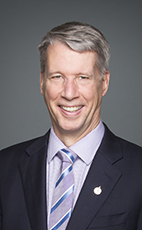Mr. Speaker, I am delighted to speak today about this important topic.
The government is committed to revitalizing Canadian diplomacy and leadership on key international issues and in multinational institutions. This includes increasing Canada's support to the United Nations peace operations and its mediation, conflict prevention, and peacebuilding efforts, much in the tradition of what we have done over the last 20 to 30 years.
We have advanced our preparations to deliver on this commitment, and Canada's efforts will focus in four main areas: providing personnel and training for UN operations; strengthening Canadian support for conflict prevention, mediation, and peacebuilding; advancing the roles of women and youth in peace and security; and making UN peace operations more effective.
Canada's engagement will build upon our character as a modern, bilingual, and federal nation that is diverse, empowers women, and respects human rights—something we are all extraordinarily proud of—while tapping the skill of our high-quality personnel who, as my hon. colleague and I both know, are the very best in the world at what they do.
We will adopt a comprehensive and integrated approach. Today's conflicts come in many guises and call for political and humanitarian intervention as well as action on security and development fronts.
We will ensure that our foreign policy, international aid, military action, and security instruments are used to strengthen each other's capacity.
This is good timing for Canada's revitalized engagement in United Nations peace operations. Threats to international peace have become more complex, and in our increasingly interconnected world, the consequences are that much greater for us all.
Increasing Canada's support for UN-led interventions is an effective means by which we can reach out and help those who need it most.
Contributing to peace operations helps promote the values Canadians hold so dear. We live in an interconnected world. What happens over there can and will have an impact at home. Peacekeeping missions advance human rights, promote democracy and the rule of law, as I and many thousands of others have seen first-hand. They seek to build and sustain peace and to protect individuals against violence, affirm human dignity, secure liberty, and create an environment conducive to long-term development. Participation in peace operations extends our influence in multilateral institutions and with our allies.
As part of Canada's leadership, the Minister of National Defence has committed up to 600 Canadian Armed Forces personnel and related capabilities to be made available to the UN for peace missions, a standing force, so to speak. Canada will also provide scaled-up contributions of police and civilian personnel and support new training initiatives. These contributions will be complemented as appropriate by targeted stabilization, security and developmental programming, a whole of government approach building on the lessons we have learned in the former Yugoslavia and Africa and times before, and of course Afghanistan.
Any decision to deploy the men and women of the Canadian Armed Forces is not taken lightly. Strict assessment criteria will be applied and a rigorous analysis will be conducted. We will make sure that we network with our friends and allies around the world to ensure we understand the constraints and the environment to which we are about to deploy.
The choice of where and how to engage is one that deserves careful reflection, one that will be made by cabinet in due course. As a matter of fact, a variety of studies are under way. We must ensure that we do it for the right reasons such that we have a meaningful impact on international peace and stability.
We will also seize the opportunity to ensure that women are empowered to make important decisions, to be a part of this force, and will do all due diligence in attacking gender-based violence, including sexual exploitation and abuse by local or indigenous or other UN personnel.
The United Nations needs our help.
It is my honour and pleasure to try and answer my distinguished colleague's questions.

